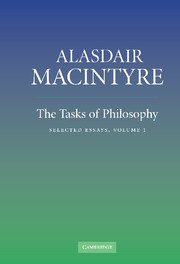Book contents
- Frontmatter
- Contents
- Preface
- Acknowledgments
- PART I DEFINING A PHILOSOPHICAL STANCE
- 1 Epistemological crises, dramatic narrative, and the philosophy of science
- 2 Colors, cultures, and practices
- 3 Moral relativism, truth, and justification
- 4 Hegel on faces and skulls
- 5 What is a human body?
- 6 Moral philosophy and contemporary social practice: what holds them apart?
- PART II THE ENDS OF PHILOSOPHICAL ENQUIRY
- Index
1 - Epistemological crises, dramatic narrative, and the philosophy of science
Published online by Cambridge University Press: 05 June 2012
- Frontmatter
- Contents
- Preface
- Acknowledgments
- PART I DEFINING A PHILOSOPHICAL STANCE
- 1 Epistemological crises, dramatic narrative, and the philosophy of science
- 2 Colors, cultures, and practices
- 3 Moral relativism, truth, and justification
- 4 Hegel on faces and skulls
- 5 What is a human body?
- 6 Moral philosophy and contemporary social practice: what holds them apart?
- PART II THE ENDS OF PHILOSOPHICAL ENQUIRY
- Index
Summary
What is an epistemological crisis? Consider, first, the situation of ordinary agents who are thrown into such crises. Someone who has believed that he was highly valued by his employers and colleagues is suddenly fired; someone proposed for membership of a club whose members were all, so he believed, close friends is blackballed. Or someone falls in love and needs to know what the loved one really feels; someone falls out of love and needs to know how he or she can possibly have been so mistaken in the other. For all such persons the relationship of seems to is becomes crucial. It is in such situations that ordinary agents who have never learned anything about academic philosophy are apt to rediscover for themselves versions of the other-minds problem and the problem of the justification of induction. They discover, that is, that there is a problem about the rational justification of inferences from premises about the behavior of other people to conclusions about their thoughts, feelings, and attitudes and of inferences from premises about how individuals have acted in the past to conclusions expressed as generalizations about their behavior, generalizations which would enable us to make reasonably reliable predications about their future behavior. What they took to be evidence pointing unambiguously in some one direction now turns out to have been equally susceptible of rival interpretations.
- Type
- Chapter
- Information
- The Tasks of PhilosophySelected Essays, pp. 3 - 23Publisher: Cambridge University PressPrint publication year: 2006
- 9
- Cited by

